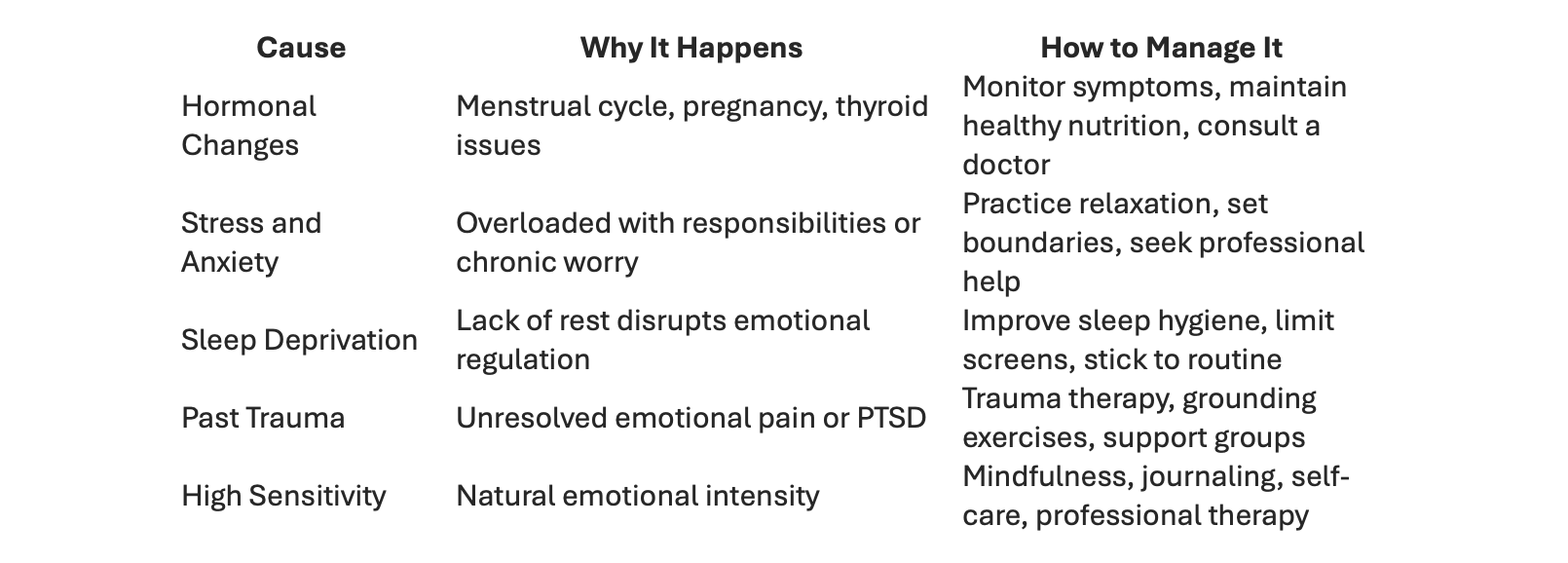
Have you ever asked yourself, “Why am I so emotional lately?” or “Why do I feel so emotional for no reason?” Feeling emotionally overwhelmed can happen to anyone. You might cry easily, feel irritated by small things, or experience mood swings that seem hard to control.
Emotions are a natural part of being human, but when you start to feel emotionally overloaded, it can affect your relationships, work, and overall well-being. The good news is that emotional sensitivity is manageable once you understand what might be causing it. Let’s explore the most common reasons behind emotional overload and how to regain balance.
What Does It Mean to Feel "Too Emotional"?
Everyone experiences emotions differently. For some, being “too emotional” means crying more often or reacting strongly to small stressors. For others, it may mean feeling numb, disconnected, or easily overwhelmed with emotions.
Emotional Sensitivity vs. Emotional Overload
Emotional sensitivity refers to being more in tune with your feelings and the emotions of others. This can be a strength, especially in relationships and creativity. However, when emotions start to interfere with daily functioning, it may signal emotional overload.
You might feel like you are constantly on edge, overly empathetic, or unable to regulate your mood. These experiences can stem from physical, psychological, or environmental factors. Understanding the source is the first step toward improving emotional regulation.
Common Reasons Why You Might Feel Emotionally Overwhelmed
Below are some of the most frequent causes of emotional overload and practical ways to address them.
Hormonal Changes and Biological Factors
Hormonal shifts are one of the most common reasons people feel emotionally overwhelmed. Fluctuations during the menstrual cycle, pregnancy, menopause, or thyroid disorders can directly affect mood and energy levels. Hormones influence neurotransmitters such as serotonin, which is essential for emotional stability.
How to cope:
- Keep track of your mood patterns during your cycle or other hormonal changes.
- Discuss your symptoms with your healthcare provider. Blood tests can help rule out thyroid issues or hormonal imbalances.
- Maintain a balanced diet rich in omega-3s, whole grains, and leafy greens to support hormonal health.
If your emotions are linked to long-term mood changes, exploring psychiatrist treatment for depression may also be helpful.
Stress, Anxiety, and Mental Health Conditions
Chronic stress and anxiety can make you feel emotionally exhausted and unable to cope. When stress hormones like cortisol remain high, your body stays in a constant “fight or flight” state. This can cause irritability, crying spells, or feelings of helplessness.
In some cases, emotional overload may be a sign of an underlying anxiety disorder or depression.
How to manage it:
- Set clear boundaries and say no to unnecessary commitments.
- Try relaxation techniques such as deep breathing, meditation, or yoga.
- Speak with a professional for online help for anxiety or stress management support.
Research from the American Psychological Association shows that regular mindfulness practice significantly improves emotional regulation and reduces stress levels.
Lack of Sleep and Poor Diet
Sleep and nutrition are two of the biggest influences on emotional health. A lack of rest disrupts your brain’s ability to manage mood, while poor diet can reduce energy and mental clarity. People who do not get enough sleep are more likely to feel irritable, sad, or overwhelmed by emotions.
What you can do:
- Follow a consistent sleep schedule and avoid screens at least 30 minutes before bed.
- Limit caffeine and sugar intake, especially in the afternoon.
- Focus on nutrient-rich meals that include complex carbohydrates, protein, and healthy fats.
Read more about the importance of sleep for mental health and how better rest can reduce emotional sensitivity.
Past Trauma and Emotional Triggers
Unresolved trauma can make emotions feel intense or unpredictable. People who have experienced abuse, loss, or a major life event may have a lower threshold for emotional triggers. Post-traumatic stress disorder (PTSD) can also make individuals feel overwhelmed with emotions in seemingly ordinary situations.
How to heal:
- Recognize your triggers and give yourself permission to pause when they occur.
- Try grounding exercises, such as focusing on your breath or describing your surroundings aloud.
- Seek support from a licensed trauma therapist online who can guide you through trauma-informed techniques such as EMDR or CBT.
According to the National Institute for Mental Health, trauma-focused therapy is one of the most effective treatments for reducing emotional reactivity.
Personality Traits and High Sensitivity
Some people are naturally more emotionally attuned. Known as Highly Sensitive People (HSPs), they tend to feel emotions more deeply and notice subtle changes in their environment. This personality trait is not a disorder, but it can make life feel more intense.
How to navigate high sensitivity:
- Practice self-compassion and remind yourself that emotional depth is a strength.
- Learn emotional regulation techniques such as mindfulness, journaling, or gentle movement.
- Build quiet time into your day to recharge.
If your sensitivity is accompanied by mood swings, it might be helpful to explore therapy for bipolar disorder for additional evaluation.
Additional Factors That Can Affect Emotions
- Medication side effects: Some medications, such as steroids or antidepressants, can increase emotional reactivity.
- Substance use: Alcohol and drugs can alter mood regulation and cause emotional instability.
- Social isolation: Lack of support and meaningful connection often leads to emotional distress.
What helps:
Connecting with friends, joining support groups, and seeking professional guidance can help you feel less alone and more balanced.
Causes of Emotional Sensitivity and How to Address Them

How to Handle Overwhelming Emotions
If you are feeling emotionally overwhelmed or overwhelmed by emotions, try these simple strategies to regain control.
- Pause and breathe. Take deep, slow breaths to calm your body’s stress response.
- Label your emotions. Naming your feelings helps reduce their intensity.
- Write it down. Journaling creates space between you and your emotions.
- Reach out for help. Talk to a trusted friend or a licensed therapist.
- Use grounding techniques. Focus on physical sensations to bring your attention to the present moment.
Learning how to cope with overwhelming emotions takes practice. Over time, you can build resilience and learn to control strong emotions with greater ease.
Final Thoughts: Emotions Are Normal, But Balance Matters
Feeling emotional does not mean something is wrong with you. It means you are human. However, if your overwhelming emotions start to interfere with daily life, it may be time to seek help. With the right tools and professional guidance, you can learn how to handle overwhelming emotions in a healthy and sustainable way.
At Mindful Care, we believe that emotional well-being is within everyone’s reach. Whether you are struggling with anxiety, stress, or mood changes, our team of licensed clinicians can help.
Need support? Speak with a licensed therapist today.
You do not have to face emotional overload alone. Compassionate care and small steps can lead to big changes in how you feel.





